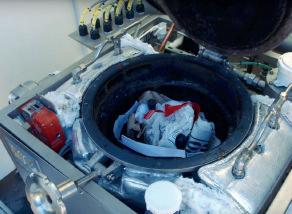
3 minute read
HERU partners with Siemens to develop boiler tech

The groundbreaking Home Energy Recovery Unit (HERU), has announced a new partnership with Europe’s largest industrial manufacturing company, Siemens.
Developed in Worcestershire, the HERU takes items destined for waste, such as coffee cups, nappies and plastics and converts them into energy to heat water.
The invention is already using Siemens’ technology and this new partnership will see Siemens support production of HERU’s Hybrid Water Heating System.
Research has shown that a HERU could take an average sized home with an average 2.4 person occupancy producing one tonne of waste from creating 1.6 tonnes of CO2 per year to minus 80kg CO2 per year for heating and hot water.
The announcement follows the appointment of James Clark Technologies as UK manufacturer for the commercial HERU. It builds on the expertise provided by the Manufacturing Technology Centre in Coventry, which has been working with HERU since 2018.
Founder and CEO of HERU, Nik Spencer said: “Siemens’ knowledge and expertise of mass industrial manufacturing is invaluable to HERU’s production and we look forward to working with them to drive future innovation of domestic and commercial HERU units.”
Professor Alan Norbury, Chief Technologist, Digital Industries at Siemens, said: “Siemens is excited to help with the future development of the HERU, particularly in the production phase where we can share 170 years of best practice and experience from our factories.”
This announcement comes after 10 months of successful technical evaluations at Wychavon District Council and six months of trials at Hillers Farm Shop in Warwickshire.
In the headlines
Electric vehicle company Arrival, which can now claim “unicorn” status (start-ups valued at more than $1 billion, or £770 million), is celebrating winning a major contract to build 10,000 electric vehicles for international courier company UPS.
The company’s unicorn status was achieved in January, after Hyundai Motor Company and Kia Motors Corporation revealed an investment of 100 million Euros in the company. UPS’s venture capital arm also has a minority investment in Arrival, which has its research and development, and a manufacturing base in Banbury.
From 2020, the vehicles will be deployed across the UK, Europe and North America, and UPS has the option to purchase a further 10,000 vehicles during this period.
The vehicles will be built using Arrival’s new method of assembly using low capital, low footprint microfactories in local communities.
Denis Sverdlov, founder and CEO at Arrival, said: “Arrival first announced a partnership with UPS in 2016 to develop electric vehicles.
“Together our teams have been creating bespoke electric vehicles, based on our flexible skateboard platforms, that meet the needs of UPS from driving, loading and unloading, depot and back office operations. We are pleased that this investment and vehicle order create even closer ties between our companies.”
Juan Perez, UPS Chief Information and Engineering Officer, said: “As mega-trends like population growth, urban migration and e-commerce continue to accelerate, we recognise the need to work with partners around the world to solve road congestion and pollution challenges for our customers and the communities we serve.
“Electric vehicles form a cornerstone to our sustainable urban delivery strategies. Taking an active investment role in Arrival enables UPS to collaborate on the design and production of the world’s most advanced electric delivery vehicles.”
Passport to science and tech paradise at Oxford Technology Park
It can be difficult negotiating Oxfordshire in the rush hour, but national and international connectivity will certainly be less of a problem for those working at one business park.
Oxford Technology Park sits next to London Oxford Airport and just a short distance from Oxford’s new(ish) Parkway Station.
A total of 14 high-quality units are now planned for the park, along with a new innovation quarter. The first two units and the innovation quarter, all built speculatively, are now being readied for occupation.
The team from Hill Street Holdings, the company behind the privatelyowned Oxford Technology Park, have experience in the high tech market from Cambridge and East Anglia. They identified the opportunity in North Oxford for a full science and technology park some time ago.
The new innovation space will comprise smaller units, around 4-7,000 sq ft each, and will address the demand for grow-on space from serviced office, business incubation and smaller premises for up to 30-40 staff. There will be a mix of research and development, small production or manufacturing accommodation, married to office space.
And as with many of Oxfordshire’s growing number of science and technology parks, there’s lots of amenities from a gym, nursery, cafes and a new hotel and restaurant.
The proposed Oxford Technology Park development


